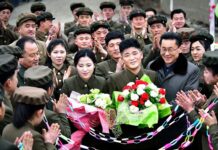Chuseok is considered one of the most important national holidays in South Korea, but this is not the case in North Korea.
North Korea’s most celebrated holidays are Kim Il Sung’s birthday (April 15th) and Kim Jong Il’s birthday (February 16th). Chuseok is no more meaningful than simply a day to groom one’s ancestral gravesites.
It was especially difficult to comfortably celebrate Chuseok this year because Chuseok fell on a Sunday, the day after the time when North Koreans are required to participate in regular evaluation meetings, lectures, and mass events.
In fact, North Korea completely neglected Seolnal (Lunar New Year’s Day) and Chuseok up until the mid-1980s, claiming that they originated from China.
However, Pyongyang began showing an interest in national holidays at the time of the “13th World Festival for Youth and Students,” held in Pyongyang in 1989. The North Korean authorities felt it necessary to propagate the excellence of its national history through national traditions on display for the foreigners attending the festival; including Seolnal and Chuseok.
As a consequence, some North Koreans began to perceive that Chuseok was a valuable national holiday, not a Chinese holiday. However, Chuseok still has a tendency to be considered a day off to take care of a forefather’s gravesite rather than a true national holiday.
The second reason why Chuseok is just considered a day off is because of North Korea’s poor infrastructure and North Koreans’ economic hardship.
The North Korean authorities grant a special break the day before Chuseok for those whose forefathers’ gravesites are far away in order to minimize any inconvenience. On the day off, the authorities even “guarantee” North Koreans’ convenience by increasing the numbers of trains and buses.
However due to the extremely poor infrastructure in North Korea and the complicated process of transit, it is almost impossible for families to gather together on Chuseok.
When the authorities speak of increasing the number of buses and trains for the convenience of North Koreans, they only increase the schedule by one or two. North Koreans cannot even consider visiting families because in order for them to travel to different provinces or districts, they need to be granted an official travel certificate.
Most North Koreans visiting their forefathers’ gravesites therefore have to walk approximately 39km (24 miles). If they want to visit gravesites in different districts, then they have to request a travel certificate, get a train ticket 10 days in advance and get ready to stand on a busy train for two or three days.
A third reason why it is difficult for North Koreans to comfortably celebrate Chuseok is related to the fact that Chuseok is in “autumn.” For North Koreans, autumn is an extremely busy season. Not only farmers but factory workers, housewives and even students are mobilized to harvest and transport crops. Furthermore, each household has to prepare and get ready to survive the long winter. Therefore, taking care of forefathers has to be put on the back burner.
Nevertheless, there are an increased number of so called bourgeoisie-high ranking officials or successful businessmen- visiting forefathers’ gravesites these days. But the reason for such visits is aberrant. They visit not to pay respects to deceased forefathers but to gain money, power and promotion by exercising superstitions.
Among Pyongyang citizens in the early 21st century, covertly visiting fortunetellers and paying exorbitant amounts of money to get one’s fortune told became popular. The trend has quickly spread not just among regular residents but among North Korean intelligentsia such as Party members, military personnel and educators.
Blaming forefathers for any negative fortune is a commonality found among North Korean fortunetellers. Therefore, in order to reverse such a fortune, forefather’s gravesites are often mentioned. The fortunetellers often advise taking better care of the ceremonial tables by forefathers’ gravesites. For this reason, many North Koreans spend time going to their forefathers’ gravesites despite their distance.
These people visit the forefathers’ gravesites to bury money near the gravesites (they bury 55 won or 555 won hoping for more money to come to them since the sound of number 5 in Korean means “to come”) or to burn red cloth to spread ashes in a certain direction following fortunetellers’ instructions. For them, Chuseok is a day to practice superstition for their survival in front of forefathers’ gravesites.
In South Korea, people spend money on Chuseok to share gifts or to prepare food for their families. However, North Koreans on this day spend money to exercise age-old superstitions. At least these people have money to spend. There is no extra public distribution at Chuseok in North Korea. Therefore, Chuseok means nothing to those poor North Koreans who have no money. It is just another day to worry about what they are going to eat.



















